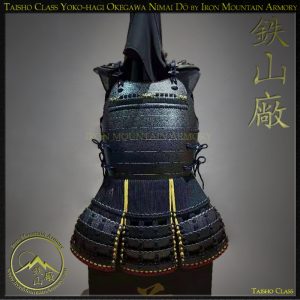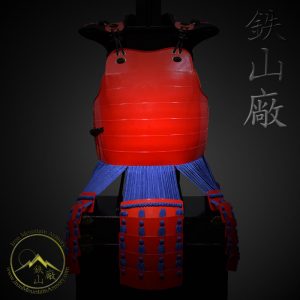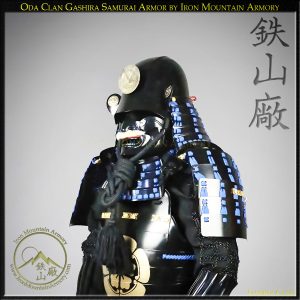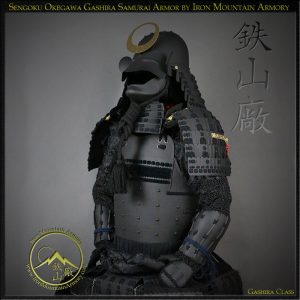- Traditionally Handcrafted
- Customizable
- Shipped Direct From The Armory
- Best Price Guarantee
- World wide delivery
The traditional name for this style of Dō is: “Byo-toji Yokohagi Okegawa Gendai Ni-mai-Dō ”. It is another style of the most common Dō used by high ranking samurai and ashigaru (foot soldiers) alike, due to the simplicity of its design, toward the end of the Sengoku Era (warring states). The Byo-Toji Yokohagi Okegawa-Do featured a horizontal plate design with raised rivets, used for holding the overlapping ito-mono plating in place and partly for decoration. Because the armor was designed with a single hinge under the left arm it allowed the wearer to slide into the Dō and tie it closed from the other side, also known as a “clam shell” Dō .
This combination of design creates a very strong, shock absorbing, layered Dō which is more economical, comfortable, less maintenance and more reliable in battle than previous chest armors. This Gashira Class Dō features a traditional pin hinge under the left armpit, which can be removed, after with an attached cord can be adjusted, to make a simple ni-mai-Dō , to accommodate those with a larger or smaller chest. The ita-mono may utilize some spot welding to strengthen the design for safety, maintenance and economic reasons. Removable Tate-Eri (shoulder padding with kikko plating) for added comfort and protection.
Features: Traditional Gashira Class Tosei Yokohagi Okegawa design.
Handcrafted by Iron Mountain Armory at the time of your order. Please allow at least 2 to 3 weeks for crafting time.
CHEST MONS: This Samurai Do can be ordered with a Mon painted onto the front plate. For an extra fee, you can select one from our list of Standard Mon’s, or have your own Crest applied for an additional fee.
To have your own Mon painted: #1: Select the “Custom Mon” option. #2: Complete the purchase through our Shopping Cart. #3: Send a high quality image of the Mon / Logo to the confirmation email you receive from us.
Note: We handpaint these Mon’s, and they can only be simple “Clip-Art” style designs in a single color. If you would like a Mon but select a “Suna” type paint color, your Mon image may turn out blurry due to the paint texture.
Ordering Tips: We recommend that you order one size larger AND one size shorter than the size required, if you are between height options. The armor is close fitting. It can close into itself if too big, or be a little uncomfortable if fitted too tall. If you’re planning on wearing a yoroi hitatare or a kikko gane do under the armor, we suggest adding 10 cm to your chest size when ordering. The Okegawa-Do features a pin hinge under the left armpit, which can be removed and a cord attached to make it a traditional Ni-Mai style Do.
To see the class differences, please view Kachi Vs. Gashira.
[table id=PF /]
References: “Samurai Armour: Volume I: The Japanese Cuirass” by Trevor Absolon / “Art of the Samurai: Japanese Arms and Armor, 1156-1868″ by Kazutoshi Harada, Metropolitan Museum of Art



